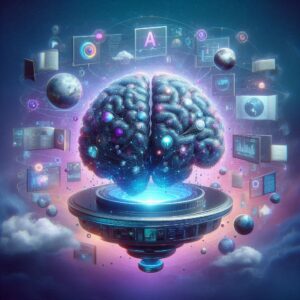Unlocking the Full Potential of AI in Transformative Content Creation: Merging Technology with Creative Insight
The realm of AI-driven content creation is undergoing a revolutionary change, significantly reshaping our interactions with digital media. As more sophisticated artificial intelligence (AI) tools come to the forefront, their influence on our content strategies becomes essential. These innovative technologies have redefined how we approach writing, editing, and distributing content. They automate repetitive tasks and enhance our operational workflows, enabling us to streamline processes such as crafting captivating blog posts and creating engaging social media content. This not only boosts our productivity but also enriches our interactions with the audience, fundamentally altering our connection with the target market.
This technological advancement serves as a critical asset for businesses and content creators striving to consistently produce high-quality content. By harnessing the capabilities of AI, we can reclaim precious time and resources, allowing us to direct our focus on strategic initiatives while maintaining a steady stream of compelling content. However, as we weave these advanced technologies into our workflows, it’s imperative to consider the ramifications of heavily relying on AI for content generation, particularly regarding the quality and authenticity of the output.
While automation can vastly improve efficiency, it fosters important discussions around authenticity, content quality, and the ethical implications of employing AI. The core challenge lies in striking the right balance between leveraging AI’s strengths and upholding the distinctive voice and fundamental values that define our brands. As we navigate the intricate landscape of AI-enhanced content creation, we must closely assess both the advantages and potential drawbacks of this groundbreaking approach.
Essential Insights for Mastering AI-Enhanced Content Creation
- AI-enhanced content creation is revolutionizing our production techniques, facilitating quicker and more effective workflows.
- Automation plays a vital role in content generation, minimizing manual effort and significantly elevating overall productivity.
- Maintaining authenticity in AI-generated content is crucial for building connections with audiences and aligning with the brand’s unique identity and core values.
- Key ethical considerations in AI-driven content creation include data privacy, algorithmic bias, and the potential implications for employment in the content sector.
- Striking the right balance between automation and human creativity is vital for optimizing AI’s advantages while prioritizing emotional intelligence and innovative thought.
 Transforming Content Creation Strategies Through Automation
Transforming Content Creation Strategies Through Automation
The rise of automation has dramatically reshaped our methodologies for both content creation and distribution, allowing us to handle time-intensive tasks with remarkable speed and precision. Advanced technologies like natural language processing (NLP) and cutting-edge machine learning models are essential for the swift generation of written materials. For instance, leading-edge platforms such as OpenAI’s GPT-4o can rapidly produce cohesive articles, concise summaries, and imaginative stories within moments, resulting in a significant boost in our productivity.
This extraordinary capability not only conserves valuable time but also allows us to expand our content production efforts exponentially. By automating routine tasks such as keyword research, performance tracking, and social media management, we can redirect our attention toward crafting narratives that truly resonate with our target audience. Nevertheless, despite the myriad advantages offered by automation, we must remain aware of its limitations and potential pitfalls.
While AI can generate vast quantities of content, it frequently lacks the nuanced understanding of human emotions and cultural contexts essential for producing genuinely engaging materials. As we increasingly depend on automated systems, there is a danger that our content may become formulaic or overly generic, diluting the unique essence that characterizes our brand identity. Thus, it is critical to strike a careful balance between utilizing automation for enhanced efficiency and preserving the authenticity and relatability of our content.
Safeguarding Brand Authenticity in AI-Generated Content
One of the most pressing challenges presented by AI-driven content creation is the preservation of authenticity. As we progressively rely on AI tools for generating content, there exists a genuine risk that our brand’s unique voice and core values may be overshadowed or diminished. For example, brands that excessively depend on automated content could unwittingly produce outputs that feel mechanical or devoid of the emotional depth that consumers crave.
The potential decline in authenticity can create a disconnect between the brand and its audience, endangering trust and engagement. To mitigate this issue, it is crucial to prioritize human oversight throughout the content creation process. Involving skilled writers and editors in refining AI-generated output ensures that the final content aligns seamlessly with our brand’s tone and messaging.
This collaborative strategy allows us to capitalize on AI’s efficiency while preserving the authenticity that sets our brand apart in a competitive landscape. Additionally, training AI systems to comprehend specific brand language and values can empower them to produce content that genuinely resonates with our target audience. By adopting these proactive measures, we can achieve a harmonious balance between automation and authenticity, ensuring our content faithfully reflects our brand identity.
 Navigating Ethical Challenges in AI-Driven Content Creation
Navigating Ethical Challenges in AI-Driven Content Creation
As we embrace AI technologies in content creation, it is vital to address the myriad ethical issues that accompany their use. A primary concern centers around plagiarism and the potential spread of misinformation linked to AI-generated outputs. Given that AI systems are trained on expansive datasets, which may contain copyrighted materials or biased information, there exists a risk of unintentional duplication or the dissemination of inaccuracies.
This scenario not only presents legal obstacles but also undermines the integrity of our brands and the trust we cultivate with our audiences. Additionally, biases embedded within training data can lead to misrepresentation in AI-generated content. If we neglect to actively confront these biases, we risk perpetuating stereotypes or sidelining perspectives in our narratives, ultimately harming our brand’s reputation.
To adeptly navigate these ethical complexities, we must establish comprehensive guidelines for the responsible application of AI in content creation. This includes conducting rigorous audits of training data, fostering transparency in our methodologies, and cultivating a culture of accountability within our teams. By prioritizing ethical considerations, we can harness AI’s transformative potential while remaining committed to integrity and social responsibility.
Striking a Balance Between Automation and Human Creativity in Content Development
Achieving the right equilibrium between automation and human creativity is paramount for effective content creation in an AI-enhanced environment. While AI excels at managing repetitive tasks such as data analysis and content structuring, we must acknowledge the irreplaceable value of human creativity and intuition. By adopting a hybrid model that combines AI’s strengths with human insights, we can substantially elevate the effectiveness of our content creation endeavors.
For instance, AI tools can be employed to analyze audience preferences and identify emerging trends, while skilled writers spearhead the effort in crafting compelling narratives that resonate with readers. This collaborative approach not only boosts productivity but also fosters a culture of innovation within our teams. By nurturing open communication between AI systems and human creators, we can leverage insights from both domains to produce high-quality content that authentically embodies our brand’s values.
This equilibrium also enables us to remain agile in responding to shifting consumer preferences and market dynamics, ensuring our content continues to engage and resonate with our audience.
 Exploring the Transformative Impact of AI on Content Creation Industries
Exploring the Transformative Impact of AI on Content Creation Industries
The integration of AI into content creation industries carries significant implications for both the production and consumption of information. As AI tools continue to advance, they are transforming traditional roles within creative teams and reshaping the content production landscape. For instance, copywriters may find themselves collaborating with AI systems to enhance their work, rather than viewing them purely as competitors.
This transition opens doors to reimagining roles within the industry, allowing professionals to concentrate on strategic thinking while utilizing automation for routine tasks. Furthermore, AI’s influence extends beyond individual creators; it reshapes entire sectors by altering how businesses formulate their marketing and communication strategies. Companies that successfully incorporate AI into their content creation processes can gain a competitive advantage by producing substantial volumes of high-quality materials while maintaining brand authenticity.
As we continue to explore AI’s potential in content creation, it is essential to remain adaptable and receptive to how these technologies can augment our creative efforts rather than replace them entirely.
Adopting Best Practices for Seamless AI Integration in Content Creation
Effectively integrating AI into our content creation frameworks necessitates the implementation of best practices that prioritize both efficiency and authenticity. First and foremost, it is vital to establish clear guidelines regarding the utilization of AI tools. This includes defining which tasks are suitable for automation while ensuring that human oversight remains integral throughout the process.
By delineating these boundaries, we create a structured approach that maximizes AI’s advantages without compromising content quality or our brand’s integrity. Additionally, investing in training and development for our teams is crucial as we navigate this rapidly evolving landscape. Equipping ourselves with the necessary knowledge and skills to effectively harness AI tools fosters a culture of innovation within our organizations.
Regular evaluations and adaptations of our processes will also help us stay aligned with emerging trends and evolving consumer preferences in content creation. Ultimately, by embracing best practices for AI integration into our workflows, we can enhance efficiency while preserving the authenticity that characterizes our brands.
 Envisioning the Future of AI-Enhanced Content Creation
Envisioning the Future of AI-Enhanced Content Creation
The future of AI-driven content creation is rife with extraordinary potential, signaling significant innovation and growth on the horizon. As technology evolves, we anticipate advancements that will further enhance the capabilities of AI tools in producing high-quality content. For example, breakthroughs in natural language understanding may empower AI systems to generate even more nuanced and contextually relevant materials, appealing to a wider audience.
Moreover, as brands increasingly recognize the vital importance of authenticity in their messaging, there will likely be an intensified focus on developing AI systems that closely align with specific brand values and identities. This progression will facilitate the creation of more personalized consumer experiences while ensuring transparency in the use of AI for content creation. As we embrace these advancements, it is essential to maintain a balance between automation and authenticity—ensuring that technology serves to enhance creativity rather than replace it entirely.
As we navigate the realm of AI-enhanced content creation, it is critical to acknowledge both the advantages and challenges that accompany these technologies. By adopting best practices, emphasizing authenticity and ethical considerations, and leveraging automation for efficiency, we can successfully traverse this evolving landscape. We encourage creators and brands to explore AI tools that amplify their distinctive voices, enhancing rather than substituting their authentic narratives, thereby fostering deeper connections with their audiences.
When considering the complexities of AI-powered content creation, it’s crucial to reflect on how cultural norms influence digital communication. An insightful article that explores this topic is “The Effects of Cultural Norms on Interpersonal Relations,” accessible at this link. This valuable resource examines how various cultural backgrounds shape the perception and understanding of messages, offering essential insights into the necessity of authenticity in automated content. It is a must-read for anyone striving to ensure that AI-generated content resonates effectively across diverse audiences.
Common Questions Regarding AI-Driven Content Creation
What Does AI-Powered Content Creation Entail and How Does It Operate?
AI-powered content creation involves the application of artificial intelligence technologies to generate a variety of content forms, including written articles, visual graphics, social media posts, and audio or video content. This process typically utilizes machine learning algorithms that analyze vast datasets, enabling AI to produce new content based on patterns and insights derived from its training data.
What Are the Main Advantages of AI-Driven Content Creation?
The benefits of AI-powered content creation encompass increased efficiency and productivity, the capacity to produce substantial volumes of content at scale, and the potential for crafting tailored, targeted content based on user data and preferences. By employing AI, businesses can streamline their workflows, allowing them to concentrate on generating meaningful, high-quality materials.
What Challenges May Arise from AI-Powered Content Creation?
Despite the numerous advantages associated with AI-powered content creation, it also presents potential challenges, such as the risk of generating generic or low-quality content, the potential for biases inherent in AI algorithms, and the ongoing struggle to maintain authenticity and human connection in machine-generated materials. Addressing these challenges is crucial for ensuring effective and engaging content.
How Can Businesses Maintain Authenticity While Embracing AI in Content Creation?
To achieve a harmonious balance between automation and authenticity in AI-driven content creation, businesses should view AI as a complementary tool that enhances human creativity rather than a complete replacement. This approach may involve establishing clear guidelines and quality standards for AI-generated content while incorporating human input and oversight throughout the creation process to ensure alignment with brand values and messaging.
The post-AI-Powered Content Creation: Merging Automation and Authenticity appeared first on https://ezi.gold/.
The Article: AI-Powered Content Creation for Authentic and Automated Results Was Found On https://ai.ezi.gold
The Article AI-Powered Content Creation for Genuine Automated Results Was Found On https://limitsofstrategy.com
The Article AI-Powered Content Creation for Authentic Automated Outcomes First Appeared ON
: https://ad4sc.com





Comments are closed